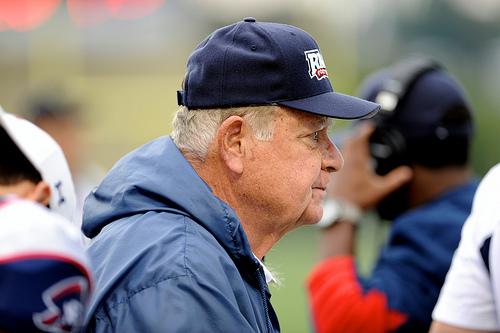Colonial Classics: The Legacy of Joe Walton

Walton was the father of RMU football, coaching the program when it began in 1994 to 2013 Photo credit: Bill Paterson
October 19, 2022
Being on this campus for almost two months now and seeing Joe Walton Stadium nearly every day, I was struck with a question. Who was Joe Walton, and what did he do to get a stadium named after him? I asked my communications professor, Dr. John Locke (’99), that exact question and realized the answer to my question was far more complicated than I had anticipated.
Playing Career
Joe Walton was born on Dec. 15, 1935, in Beaver Falls, Pennsylvania. Walton was the son of Frank “Tiger” Walton, an offensive lineman who played at the University of Pittsburgh for three seasons in the Redskins organization.
Following his father’s footsteps, Joe Walton attended the University of Pittsburgh and played football. While there, Walton excelled all four years, eventually earning All-American honors in his junior and senior years. In his junior year, he broke a school record for receiving touchdowns with eight, a considerable amount in the run-heavy era in which he played. Even with all his successes on the field, Walton never slacked in the classroom, eventually earning Academic All-American honors as a senior.
After his college career, Walton entered the 1957 NFL Draft. He was selected in the second round by the New York Giants, where he would play for four seasons, from 1957 to 1960. Before the 1961 season, Walton was involved in a three-team trade, which landed him with the Redskins. He would play there from 1961 to 1964. His career was cut short due to two injuries he sustained in the 1964 season, with injuries to his shoulder and knee. After the 1964 season, Walton announced his retirement.
NFL Coaching
Although his body would not let him play football anymore, Walton stayed around the game, and in 1965 he became a scout for the New York Giants. Little did he know this would be the start of an almost 50-year coaching career.
He would stay around the Giants organization, and in 1969, he became the wide receivers coach and the offensive coordinator a year later. After being a coach in the Giants organization for eight years, Walton would move on to the Washington Redskins, where he would become the running backs coach and hold that position for three years.
In 1978, he was promoted to offensive coordinator, a position he held for three years. In 1981, he would again move organizations, this time going to the New York Jets as an offensive coordinator. After holding that position for two years, he was promoted to the team’s head coach.
As the head coach of the Jets, Walton would go 53-57-1 and lead them to the playoffs twice. Near the end of his time with the Jets, Walton’s teams would begin to struggle, going 4-12 in his last year as head coach.
After his final year, Walton would be personally recruited to the Steelers by Hall of Fame head coach Chuck Noll. Noll would ask Walton to become the offensive coordinator so that Walton would leave the Jets after seven years as head coach. Walton would be the Steelers’ offensive coordinator for two years. In 1991, he retired.
Or so he thought…
RMU Coaching

Post-retirement, Walton would live a peaceful life in his childhood hometown, Beaver Falls, Pa. That was until then-Robert Morris University president, Edward Nicholson, asked Walton to come to the university and create a football program. And with that, Walton was hired as head football coach in July of 1993, and Robert Morris University (at the time Robert Morris College) would have its first football season in 1994 as an independent team. Walton would lead the team to a 7-1-1 record in its inaugural season.
The following season, they would again find success, allowing them to join the newly formed Northeast Conference. This would be the start of something beautiful, as the Colonials would win the conference title in their first year. They would then do it again the following year. And again the following year. And again. And again. Walton led the Colonials to conference titles five years in a row, from 1996 to 2000.
In the last year of their dominant stretch, the Colonials would go undefeated with a record of 10-0. Even more impressive, they would finish that season with a 17-game winning streak, dating back to their championship-winning 1999 season. During this dominant stretch, Joe Walton won the NEC Coach of the Year award thrice in 1996, 1997, and 1999.
Walton’s teams would maintain success throughout the next decade, with his sixth and final NEC conference title coming in 2010. This team would be a part of NEC history, as it was the first team to garner a playoff berth, where they would eventually fall to FCS powerhouse North Dakota State. This year’s success would give Walton another NEC Coach of the Year award, his fourth.
Walton would continue coaching through the end of the 2013 season, after which he would retire after having been at the helm of the Colonials organization for 20 years. Walton would finish his career at Robert Morris with 114 victories.
Post Retirement
Despite retirement, Walton continued to receive honors and awards for his coaching. He was elected into the Robert Morris Athletic Hall of Fame in November 2013. He would also be placed in the NEC Hall of Fame soon after as part of the 2013-2014 class.
What might be Walton’s most significant accomplishment was being given the Bob Prince Award in 2014. This award is given to somebody who “embodies enthusiasm for Pittsburgh sports.” This award has been shown to Pittsburgh legends such as Andrew McCutchen, Myron Cope, “Mean” Joe Green, and Bill Hillgrove. Sadly, in August of 2021, Joe Walton passed away at 85.
Joe Walton will always be a staple in Robert Morris’ history, being the man who started a program from scratch. His legacy will always be remembered in the Moon area.












